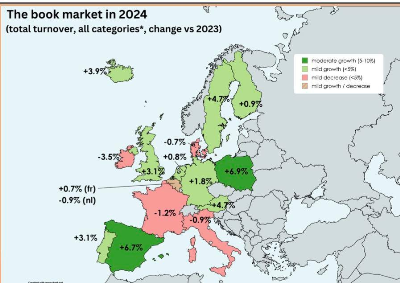
© Facebook Viktor Kruglov
2,5 млрд книжок продано у Європі за минулий рік. Два з половиною мільярди. В активному доступному каталозі - 14,3 млн назв. Це не описка. Чотирнадцять мільйонів триста тисяч тайтлів книжок у доступі, з них 3,4 млн назв у цифровому чи аудіо форматі. Десять років тому було всього 9,7 млн назв. В Україні приблизно в 100! раз менше. Країни лідери по новим виданням:
Британія, Німеччина, Іспанія, Італія, Франція, Польща. Десь чверть книжок йде до публічних бібліотек, бо в Європі фонди кожні 4-5 років оновлюються. Це свідома політика громад.
У нас навіть російські та радянські книжки з заповідями комунізму зберігаються в бібліотеках. Бо замінити нема чим. В Україні поки що говорять про важливість книжки та пріоритет культурі. Чекаємо на дії.
На карті видно в яких країнах та як зростають книжкові ринки. Може проблеми
Джерело: Європейська федерація видавців.
Why Europe's book boom speaks to Ukraine's cultural crisis. Publisher Viktor Kruglov sums it up
2.5 billion books were sold in Europe last year. Two and a half billion. The active, publicly accessible catalogue now contains 14.3 million titles. This is not a typo. Fourteen million three hundred thousand book titles available, including 3.4 million in digital or audio format. Ten years ago, there were only 9.7 million titles. In Ukraine, the figure is roughly 100 times smaller. The leading countries in publishing new titles are the United Kingdom, Germany, Spain, Italy, France, and Poland. About a quarter of all books go directly to public libraries, as European library collections are renewed every 4–5 years. This is a deliberate policy choice made by local communities. In contrast, Ukrainian libraries still store Russian and Soviet books filled with communist propaganda — simply because there is nothing to replace them with. In Ukraine, people continue to talk about the importance of books and the priority of culture. We are still waiting for action. The map clearly shows where and how book markets are growing across Europe. Perhaps the political issues in France are somehow connected to a declining interest in reading? Fewer books mean more populists — because books force people to think.
Source: Federation of European Publishers.

©
1866